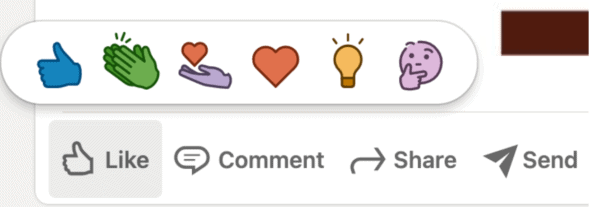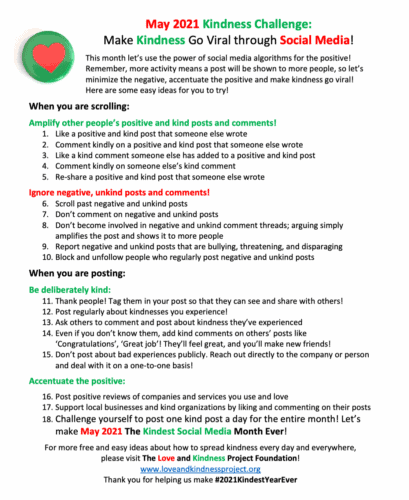Mark's note: I try to be a kind person. I sometimes get provoked, especially online. Wait, that's blaming. I sometimes get combative, online. I sometimes like to feel “right.” But is that helpful? Probably not. Is it kind? No.
Karyn Ross has been a friend and her sincere kindness inspires me to try to be a better version of myself. It's a process. Check out her Love and Kindness Project Foundation. I share this post in the spirit of reflection. Thanks to Karyn for collaborating on this.
By Mark Graban and Karyn Ross
Do you feel bombarded by negativity on social media, including LinkedIn? Are you afraid to post because of the possibility of negative comments about your post, or about you?
There are days when it seems like all we ever see are negative comments and negative posts. It can be upsetting, discouraging, hard on our mental health — and it can influence us towards negativity and unkindness.
Although you may not think that you can influence and change social media for the positive (after all, you're just one person and social media, including LinkedIn, is a big place) you can! That's because what you like and comment on, and what you ignore, don't like, and don't comment on, influences what the algorithms that social media platforms use to show you, and others, different posts.
Here are some basic facts that you need to know about social media: The goal of free social media services is to keep you on their site as long as possible, which is good for their advertising revenue. If you've watched the documentary “The Social Dilemma,” you might recognize that we, the user, are the currency of free social media platforms. If you're not paying to use the service, you're the product, as they say.
So what keeps people on social media sites for longer periods of time? One guess is conflict and negativity. If you look at posts on your feed that have huge numbers of comments, chances are you'll find that many of those comments are negative, combative and full of conflict. LinkedIn and other social media algorithms push that sort of content at us because more comments (and “likes” on comments) leads to more interaction and more time on the site, even if it's spreading negativity, conflict and unkindness.
The algorithm doesn't care about unkindess, but we do!
Because the more negativity we see and hear from others on social media, the more likely it is we will be influenced by it. Constantly being bombarded by unkindness can have negative effects on our physical and mental health, influence us to act and react in negative, unkind ways, and have a false sense that all that is happening is negative and unkind. The good thing is, we aren't powerless, and social media algorithms don't have to control what we see, think and feel. We don't have to passively stand by and let social media become more and more negative. We can change what the algorithms show us by consciously deciding how to act, react and interact while we scroll. We don't just have to leave what we, and others, see and experience to chance. To be passive acceptors of the social media world as it is: it's our social obligation to do something to change it for the better and kinder..
Here's how it works now:
Many people don't realize that when you like, comment on a post, or like a comment, there's a ‘sharing function' that kicks in. Other people's LinkedIn feeds might now highlight that post, with a phrase like “Mark Graban liked this,” which then invites you to click and see (and then maybe comment or click yourself). What you click on, like and comment on gets spread, shared, and amplified. It feeds the LinkedIn “keep people on the site so we can show them ads” algorithms.
What we can do to make our social media feeds kinder:
Below are some practical tips, ideas, and calls to action — and we invite you to consciously practice these things in the month of May…they are simple, free, quick actions that can spread kindness and make our social media feeds more positive:
If it's negative, consider just scrolling past: If you see something that's negative, awful, or you just flat disagree with it, you can just keep scrolling past. Remember, by making a comment (even if what you're saying is correct), you're also helping spread the misinformation or negativity. Some people feed on attention, even negative attention, so your disagreement (or scorn) sometimes just encourages them to share more negativity.
If you feel compelled to disagree or comment, please do it in a kind way. Ask questions, seek first to understand. As Walt Whitman wrote (recently quoted on the amazingly kind show “Ted Lasso“), “Be curious, not judgemental.”
De-escalate. There's also value, sometimes, in de-escalating an online fight by just walking away (keep on scrolling). We don't have to comment on every post or comment when we don't like or disagree with.
Consciously look for kind and positive posts and deliberately like and comment on them. When you see something kind and positive, go out of your way to like (or love) it! When you see positive comments, don't just scroll by!
Reinforce and share the positive and supportive comments, even if somebody just commented with something kind like “great job” or “congrats!” — you can click “like.”
Or, click on one of the additional icons for “congratulate” or “love.” If you hover over the “like,” those other options pop up. That works on posts and comments. Like and share kindness!

Again, when you like something positive, you'll share that positivity to others:

Add positive, kind, and supportive comments: We've heard comments from many people, particularly some of the members of the “Women in Lean” group that they are afraid to share and post on LinkedIn because they are afraid of negative (or, worse, bullying) comments and reactions. Being kind, positive, and supportive — taking those few seconds to leave a comment like “thanks for sharing” or “great thoughts!” — encourages people to share their voices.

So again, what can we do? We can practice and share kindness. We can make it a deliberate choice. On social media and elsewhere. Neither of us (Mark or Karyn) are perfectly kind, but we work at it. And we hope you will too!
Please join and try some of these actions during the month of May. Karyn will be posting even more tips on How to Be Kind on Social Media from The Love and Kindness Project Foundation in the next few days. Working together, we can help make social media kindness a new kind habit.
A PDF Full of Tips
Thanks, Karyn, for creating this PDF (click to view / download):

LinkedIn Live Video
Karyn and I did a livestream video today… here is the recording:
Thanks for checking it out.
Please scroll down (or click) to post a comment. Connect with me on LinkedIn.
Let’s build a culture of continuous improvement and psychological safety—together. If you're a leader aiming for lasting change (not just more projects), I help organizations:
- Engage people at all levels in sustainable improvement
- Shift from fear of mistakes to learning from them
- Apply Lean thinking in practical, people-centered ways
Interested in coaching or a keynote talk? Let’s talk.
Join me for a Lean Healthcare Accelerator Trip to Japan! Learn More










Karyn and I will be doing a LinkedIn Live broadcast, Tuesday May 4 at 4:30 pm ET. Follow Mark on LinkedIn to be notified when we go live:
https://www.linkedin.com/in/mgraban/